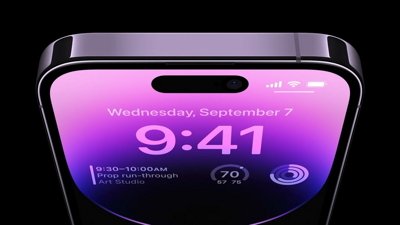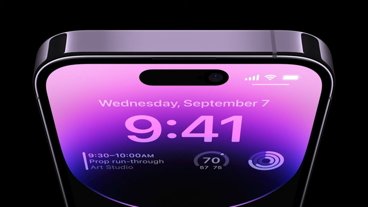O2 quarter boosted by iPhone; PayPal Safari warning; iPhoto 7.1.3
While its Irish division is just receiving the iPhone, O2 UK said on Thursday that the iPhone led its best-ever quarter at the end of 2007. Also, PayPal cautions users to avoid visiting its site with Safari, and Apple has issued an iPhoto fix.
Britain's primary cellphone carrier, O2, reported on Thursday that the iPhone was one of the primary drivers of its success in the fourth quarter of 2007.
Though still refusing to confirm or deny reported sales numbers for the specific Apple device, the provider said the 483,000 net customers it picked up during the three-month span was the most ever for the company. About 276,000 of these had signed a contract and included the iPhone customers in their ranks, as the handset requires an 18-month agreement.
O2 also boasted that the device was the "fastest selling device that [it has] ever had" in the country and that the average revenue per user is about 30 percent higher than for a typical contracted subscriber.
About 60 percent of all iPhone users have come from other providers, and the iPhone has had the highest satisfaction levels yet of any O2 device with a record low return rate, the company said.
PayPal issues Safari security warning
Apple's primary web browser is the last one any PayPal customer should use when visiting the payment site, said a new warning from the company's chief info security officer, Michael Barrett.
The technology expert cautioned that, of all the major browsers, only Safari lacks two clear anti-phishing measures. There is no filter to block or warn users of fake websites that may use a PayPal-like website address to scam users, he warned.
Safari also lacks a recent development known as an Extended Validation (EV) certificate. It turns the address bar green when visiting trusted sites that use the certificate, letting them know that the site is authentic.
While only Internet Explorer 7 currently uses EV, all browsers except Safari, including Firefox and Opera, at least support a basic filter and are likely to receive EV soon. The transactions themselves on Safari are said to be secure but may be deceptive if a phishing scam forges a security certificate.
"Safari has got nothing in terms of security support, only SSL [Secure Sockets Layer encryption], that's it," Barrett said.
iPhoto 7.1.3
Lastly, Apple has issued a minor patch for its latest version of iPhoto.
Version 7.1.3 (16.9MB) resolves issues with creating cards as well as wire-bound photo books.
 Katie Marsal
Katie Marsal













 Christine McKee
Christine McKee
 Charles Martin
Charles Martin
 William Gallagher
William Gallagher
 Andrew Orr
Andrew Orr
 Malcolm Owen
Malcolm Owen

 Chip Loder
Chip Loder








38 Comments
Barrett has a valid point about Safari. I'm quite surprised Safari wasn't one of the first browsers to detect phishing.
PayPal issues Safari security warning
Apple's primary web browser is the last one any PayPal customer should use when visiting the payment site, said a new warning from the company's chief info security officer, Michael Barrett.
The technology expert cautioned that, of all the major browsers, only Safari lacks two clear anti-phishing measures. There is no filter to block or warn users of fake websites that may use a PayPal-like website address to scam users, he warned.
Safari also lacks a recent development known as an Extended Validation (EV) certificate. It turns the address bar green when visiting trusted sites that use the certificate, letting them know that the site is authentic.
While only Internet Explorer 7 currently uses EV, all browsers except Safari, including Firefox and Opera, at least support a basic filter and are likely to receive EV soon. The transactions themselves on Safari are said to be secure but may be deceptive if a phishing scam forges a security certificate.
"Safari has got nothing in terms of security support, only SSL [Secure Sockets Layer encryption], that's it," Barrett said.
One word. 1Password. \\m/
I thought Safari 3 was supposed to have Phishing anti measures in it? Was this a killed feature?
On the Safari & PayPal issue. Safari has a great unintentional built in security measure. The keychain. If I go to paypal, the keychain auto-populates the email and password field.
If I click on a phishing link in an email, then once the page loads, my username and password are not loaded. If I try typing the first letter of my username and it doesn't load, that's a sure sign something is wrong.
However, I never get that far. Common sense tells me never to click on a link in an email from a financial institution. If I do, then I always check to make sure it's the banks website.
A good way to test, enter any old username and password you want and hit submit. If it accept it...DING, it's a phishing site.
Common sense is all you really need. All Mac users have it. Windows users need all the extra protection.
I thought Safari 3 was supposed to have Phishing anti measures in it? Was this a killed feature?
You are correct.
I'm trying to find a valid phoshing website right now to test it.
edit: This feature did not make it into the final release. Apple must have done that up-sell us Time Capsule.